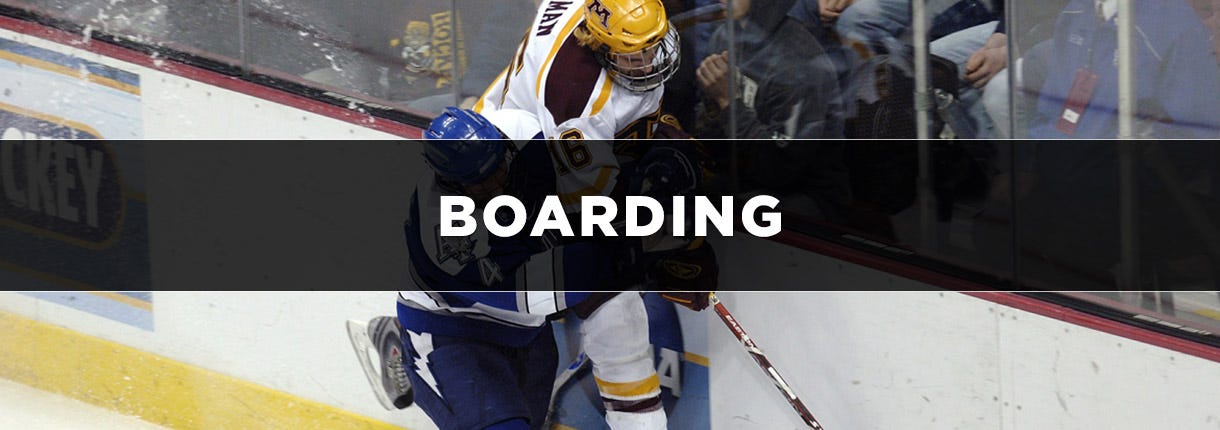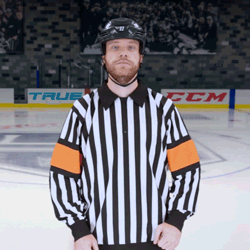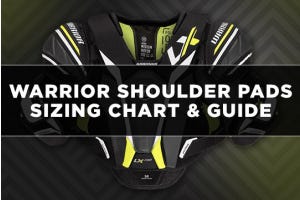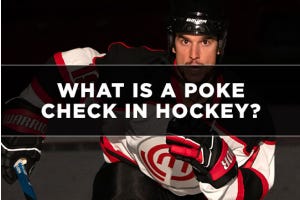What is Boarding in Hockey? Understanding the NHL’s Boarding Penalty

Boarding in Hockey is a hit on a defenseless player that causes them to go dangerously into the boards. This will include checking, or tripping, an opposing player into the boards. Standard body checking is legal, but where Boarding differentiates itself is when a player makes contact with a player when the receiving player is not aware of an incoming hit or hasn’t touched the puck, also known as a “defenseless” player. Additionally, Boarding will be called if a player hits a defenseless player with no intention of going for the puck.
In most cases, if a player hits a defenseless player in the back, causing the player to go “face-first” into the boards, it will most likely be called a penalty. Following an infraction like this, it is up to the discretion of the referee to determine the severity of the hit, and what type of penalty it deserves, which we will discuss more in-depth in this article.
To help protect yourself against potential injuries caused by hits like these, shop our website for a wide variety of hockey helmets, hockey shoulder pads, or hockey elbow pads!
- Video Example
- Referee Sign
- The Consequences of Boarding
- Official NHL Boarding Rule Text (Rule 603)
- Boarding vs. Charging
- Actions That Cause Boarding Penalties
Video Example
The video above shows the Nashville (yellow jersey) player hit the Avalanche (white jersey) in the back, with force, into the boards. There are a few factors as to why this a Boarding penalty. One, the Nashville player hit the Avalanche player in the back, without attempting to make a play on the puck. Two, the Nashville player hit the Avalanche player well after he got rid of the puck, and had enough skating room to not make contact.
Referee Sign

The Boarding sign is when the referee uses a “punching” motion of one hand and moves it towards, and makes contact with, the open palm of the other hand. The other hand will be in a vertical position. The movement will take place right in front of the referee’s chest.
The Consequences of Boarding
As alluded to earlier, it is up to the referee to determine the severity of a Boarding play. There are four different outcomes when this situation occurs.
If a player wasn’t hit hard, but was hit from behind and was deemed defenseless, the referee will usually call a Minor Penalty (two minutes). If the hit on a defenseless player is more severe, the referee can call a Major Penalty (five minutes), a Major Penalty plus game misconduct (ten-minute penalty and not allowed to play the rest of the current game), or a Match Penalty. Match penalties will usually be called if it is apparent that a player had the intent to injure the opposing player.
Official NHL Boarding Rule Text (Rule 603)
“Boarding is the action where a player, pushes, trips, or body checks an opponent causing them to go dangerously into the boards. This includes: Accelerating through the check to a player who is in a vulnerable position, driving an opponent excessively into the boards with no focus on or intent to play the puck, or any check delivered for the purpose of punishment or intimidation that causes the opponent to go unnecessarily and excessively into the boards.”
Boarding vs. Charging
Charging is very similar to boarding, however, unlike boarding, a charging play can take place anywhere on the ice, whereas boarding requires a defenseless player to get hit into the boards. A defenseless player refers to one that no longer has possession of the puck, or his back turned to the opposing (hitting) player.
The physical act of charging is exactly what it sounds like; a player charging at an opposing player, from a far distance, and slamming into them with great force. So, what differentiates charging from a standard body check? The biggest factor is the distance traveled and is always up to the referee’s discretion as to what is, or is not, a charging call.
The general rule of thumb is that if a player “takes a run” at an opposing player that is five or more skating strides away and hits them, they (infracting player) will always get called for a charging penalty.
Actions That Cause Boarding Penalties
There are a few actions that a player can commit that will lead to the referee calling a Boarding penalty every time. They are:
- Violently contacting defenseless player
- Back turned away from the play
- No longer has the puck
- Hitter has no intentions of playing the puck
- Contact into the boards
- Initial contact to the head









Login and Registration Form
or
Create an account